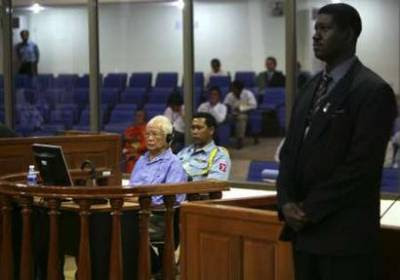The Associated Press
Published: February 27, 2009
CHA-AM, Thailand: Southeast Asian nations signed a free trade pact with Australia and New Zealand on Friday, one of the few concrete economic measures to emerge from the region's annual summit as it grapples with the worst global slump in decades.
The free trade agreement between the 10-member Association of Southeast Asian Nations could boost the combined gross domestic product of all 12 nations by more than $48 billion by 2020 but will do little to ease the current economic pain. The gross domestic product of all ASEAN countries combined is about $1.2 trillion.
The pact will "facilitate business activities at a time of global slump," said Malaysia's International Trade and Industry Minister Tan Sri Muhyiddin Yassin. "Regional integration is essential to buoy export-dependent economies in ASEAN."
Leaders and top officials from ASEAN — a region of more than 500 million people — are gathered in the Thai resort town of Cha-Am, 200 kilometers (120 miles) south of the capital Bangkok, for the grouping's 14th summit.
The meeting, usually dominated by human rights issues, is overshadowed this year by the global economic meltdown, which has already dragged the export-dependent region's most advanced economy — Singapore — into recession.
Thailand's economy shrank in the fourth quarter and others like Malaysia and Indonesia are facing rapidly slowing growth as exports crumble.
The summit has underlined that ASEAN — which groups one of Asia's richest countries with some of its poorest — has limited capacity to respond to the global economic crisis.
"There's no immediate salvation or magic bullet expected from the meeting. The problem they are facing is global," said David Cohen, head of Asian forecasting at Action Economics in Singapore. "The collapse in export demand is pinching all economies in the region."
Officials said talks about the economy have focused on sharing information about self-help mechanisms such as economic stimulus packages that various countries have announced to prop up their domestic economies.
Thailand's Deputy Prime Minister Korbsak Sabhavasu said the economic outlook remains highly uncertain. "We did agree that it's anybody's guess what is going to happen next. We have to keep a close watch," he told a press conference.
Foreign Ministers agreed informally that expanding a proposed emergency currency fund to $120 million from $80 billion was a "matter of urgency," said Thai Foreign Ministry spokesman Tharit Charungvat, but nothing was likely to be finalized at the three-day summit.
Top officials from Japan, South Korea and China — who will provide 80 percent of the fund — are not at the meeting after it was delayed for two months due to political unrest in Thailand.
Australia, whose $1 trillion economy almost equals ASEAN's combined GDP, and smaller neighbor New Zealand, called the free trade agreement a blow against the prospect of rising protectionism amid the economic slump.
"In these present economic conditions, to forge a free trade zone is a very strong affirmation from the countries concerned that their actions do speak louder than their words," New Zealand's Trade Minister Tim Groser told the Associated Press.
"This is a very big deal commercially but I also think it's a significant deal politically," he said. "We viewed Southeast Asia as a source of threat, instability and danger. To move from that to signing an agreement that sees Southeast Asia as a source of tremendous economic opportunity is a remarkable change over a 30-year period."
Australia said the agreement would cement existing low tariffs and over time eliminate tariffs covering 96 percent of the country's current exports to the region.
Its annual two-way trade with Southeast Asian countries totals about 80 billion Australian dollars ($52 billion).
New Zealand, which already has near zero tariffs on most imports, said 85 percent of ASEAN goods entering its borders will be duty free by 2010. But tariffs on New Zealand's exports will only be eliminated by 2020 and to only four countries — Indonesia, Malaysia, Philippines and Vietnam.
Countries such as Thailand have resisted lowering tariffs on mainstay New Zealand exports like milk powder and Australian manufactured vehicles. Thailand said the regional pact doesn't expand upon its bilateral agreement with New Zealand.
Pacts related to merchandise trade within ASEAN, and an investment agreement that aims to encourage the flow of capital within Southeast Asia, were signed Thursday. Ministers also signed agreements setting out arrangments for mutual recognition of each nation's dentists and doctors.
ASEAN's members are Indonesia, Malaysia, Philippines, Singapore, Thailand, Brunei, Vietnam, Laos, Myanmar and Cambodia.
Associated Press Writer Ambika Ahuja contributed to this story





















